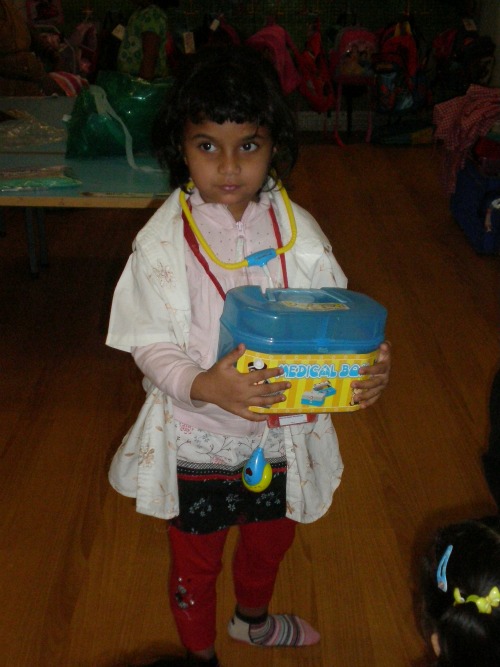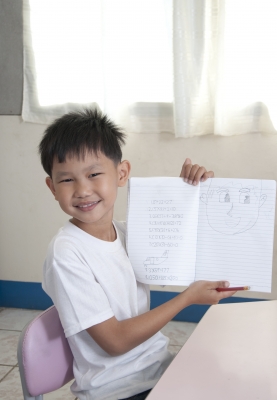 The Unit of Study for this month in my daughter’s Kindergarten class is ‘Community Helpers’. And I had the bright idea of showing her the delightful Sesame Street 2-minute “Who are the people in your neighbourhood” videos on the different professions – she would enjoy the catchy tune and colourful costumes and I could laugh at the droll puns and sing along.
The Unit of Study for this month in my daughter’s Kindergarten class is ‘Community Helpers’. And I had the bright idea of showing her the delightful Sesame Street 2-minute “Who are the people in your neighbourhood” videos on the different professions – she would enjoy the catchy tune and colourful costumes and I could laugh at the droll puns and sing along.
So the first video plays and Netra stares intensely at the man in a tall cap holding a box of vegetables, cheese and other fresh food items.
Netra (wrinkling her nose): “Who’s that?”
Me: “The grocer.” And then I go on to explain how a grocer has a small grocery store and sells food items.
Netra (waving away my explanations): “I’ve never seen a grocer shop. We only go to Cold Storage.”
Me: “Maybe here, but you have seen small grocery shops in Mumbai.”
Netra: “No – I went to Reliance Fresh. It’s a big shop.”
Me: “Ok let’s move on to the next video”.
Netra: “Who is that?” She points at a man in a blue uniform with a satchel in his hands.
Me: “The postman who delivers our letters. Don’t you know that?!”
Netra: “I know who the postman is but I thought they were extinct!”
Me: “Whaaat?! – they are people Netra, not dinosaurs! Why would they be extinct? If you want to write a letter to Brinda paati, then you need to write her address on the envelope, stick a stamp and ….”
Netra: “But amma, why can’t I just send her an email? And I skype with her everyday, so why should I….?”
Me (anticipating and stalling a string of questions): “Ok…. But next month you have to write a letter to Santa Claus and then you will have to go to the post office….”
Netra: “But you were telling daddy that everyone is on Facebook except him, so you can send a message to Santa Claus on Facebook, no amma?”
I clutch my head in despair and try to identify safer videos – we breeze through doctor, nurse, teacher, librarian. Then we come to a man with a saw and a hammer.
Netra: “Handy Manny!”
Me (sighing in relief): “Handy Manny is a handyman, but yes, this is close – a carpenter. A carpenter doesn’t just repair things but also builds furniture for you, like tables, beds….”
Netra: “I thought we go to Ikea to buy furniture and then build it ourselves!”
Me (losing patience): “Ok, you tell me what video you want to watch!”
Netra: “Why is there no investment banker in the neighbourhood?”
Re-published with permission from the blog of ParentEdge, a bi-monthly parenting magazine that aims to expose parents to global trends in learning and partner with them in the intellectual enrichment of their children.
 The high school years (Grades 9 -12) are crucial as they, whether one likes it or not, largely determine the choices a student has in college and beyond. As such, all parents are concerned about how to help their children during this time.
The high school years (Grades 9 -12) are crucial as they, whether one likes it or not, largely determine the choices a student has in college and beyond. As such, all parents are concerned about how to help their children during this time. Everyone makes mistakes. Granted, some mistakes are more significant than others and harder to get over, but they are a part of life. How individuals deal with those mistakes is significant to their self-esteem. Children who are taught from an early age to admit to their mistakes understand that it’s not a crime to make one, and they seem to have the ability to cope much better with them. They recognize that a mistake was made and admit the error.
Everyone makes mistakes. Granted, some mistakes are more significant than others and harder to get over, but they are a part of life. How individuals deal with those mistakes is significant to their self-esteem. Children who are taught from an early age to admit to their mistakes understand that it’s not a crime to make one, and they seem to have the ability to cope much better with them. They recognize that a mistake was made and admit the error.  “Moooooooooooom!”
“Moooooooooooom!” Toddlers can be fussy eaters who refuses to try a new food at least half of the time. Approximately half of all toddlers fit this description, so it is no wonder that food issues are a source of stress for parents.
Toddlers can be fussy eaters who refuses to try a new food at least half of the time. Approximately half of all toddlers fit this description, so it is no wonder that food issues are a source of stress for parents. Each year, a large number of families make the decision to take a winter vacation. Despite the fact that a large number of individuals do vacation during the summer months, there are even more families that do not. Which type of family are you?
Each year, a large number of families make the decision to take a winter vacation. Despite the fact that a large number of individuals do vacation during the summer months, there are even more families that do not. Which type of family are you? In today’s busy world, work, household chores and social activities all put a strain on your time with your child. But as you well know, it’s imperative that you spend quality time together. It helps strengthen the bond between parent and child, and lets your child know you can be trusted and counted on. Children who spend quality time with their parents often do better in school, and excel in extracurricular activities, hobbies or sports. And though it can be ‘scheduled’ to a degree, it’s something that happens when you least expect it. Therefore it’s important that you do spend as much time as possible with your child in a relaxed atmosphere and do things together that you both enjoy.
In today’s busy world, work, household chores and social activities all put a strain on your time with your child. But as you well know, it’s imperative that you spend quality time together. It helps strengthen the bond between parent and child, and lets your child know you can be trusted and counted on. Children who spend quality time with their parents often do better in school, and excel in extracurricular activities, hobbies or sports. And though it can be ‘scheduled’ to a degree, it’s something that happens when you least expect it. Therefore it’s important that you do spend as much time as possible with your child in a relaxed atmosphere and do things together that you both enjoy.